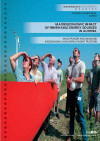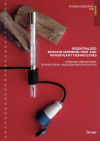Suchergebnisse
IEA Bioenergy Task 42: Biorefinery (Working Period 2007 - 2009)
Austrian Participation on IEA Bioenergy Task 42: "Biorefineries - Co-production of Fuels, Chemicals, Power, and Materials from Biomass", Triennium 2007 to 2009
IEA Bioenergy Task 39: Commercialising Conventional and Advanced Transport Biofuels from Biomass and Other Renewable Feedstocks (Working Period 2019 - 2021)
IEA Bioenergy Task 39 deals with the commercialization of conventional and advanced biofuels, including innovative raw materials, their economic, environmental and social assessment and the investigation of relevant policies. The Triennium 2019-2021 made findings from countries with a committed biofuels policy accessible to Austria, and success stories of Austrian industry, research and policy were promoted internationally.
IEA Bioenergy Task 39: Commercialization of Conventional and Advanced Liquid Biofuels from Biomass (Working Period 2016 - 2018)
IEA Bioenergy Task 39 deals with the commercialization of conventional and advanced biofuels, including innovative raw materials such as micro-algae, their economic, environmental and social assessment and the investigation of relevant policies. Findings from countries with a committed biofuels policy are made accessible to Austria, and success stories of Austrian industry, research and policy are promoted internationally.
IEA Bioenergy Task 42: Biorefining - Sustainable Processing of Biomass into a Spectrum of Marketable Bio-based Products and Bioenergy (Working Period 2010 - 2012)
Further development of the biorefinery classification system, identification of relevant biomaterial, development potential for energy and product oriented biorefineries, guideline for sustainability evaluation, global perspective on biorefineries, dissemination of knowledge, networking and involvement of stakeholders, country reports and trainingscourse.Kurzfassung
Spreading Of Small-Scale Biomass Plants In Austria

New developments Fuel supply with Biomass Pellets
Forschungsforum
3/1998
Herausgeber: BMVIT
Englisch, 6 Seiten
Downloads zur Publikation
Interregional Logistics- and Procurement Network for Forest Fuel in Austria
A concept for a cooperative forest fuel supply chain network for a large part of Austria (regions of Salzburg, Upper Austria, Lower Austria, Vienna) is developed in order to minimise transport-, storage- and total system costs while simultaneously increasing supply guarantee for the plants.
Macroeconomic Impact Of Renewable Energy Sources In Austria

Wind Power and Biomass as Economic and Employment Factors
Forschungsforum
2/2003
Herausgeber: BMVIT
Englisch, 6 Seiten
Downloads zur Publikation
Waste heat utilisation and use of renewable energy sources in a metal-working enterprise
Use of waste heat and covering of the remaining energy demand by the renewable energy sources hydropower and biomass in a metal-processing company.
Decentralized Biomass Combined Heat And Power Plant Technologies

Potential applications, technological and economic evaluation
Forschungsforum
2/1999
Herausgeber: BMVIT
Englisch, 6 Seiten
Downloads zur Publikation
Energy center for the production of heat, power, substitute natural gas and liquid biofuels
The project deals with the production of synthesis gas from biological fuels and biological residues using steam blown gasification. This synthesis gas will be used for polygeneration especially for heat, power, gaseous (substitute natural gas, SNG) and/or liquid fuel production.
Immobilization of Lipases on Corn Cob Granulate - New Key Technology for Biodiesel Production
The main objective of the project is to improve the method for producing biodiesel by enzymatic catalysis.The target is to find a method to catalyze the production of fatty acid methyl esters by corn-cob-immobilized lipases which can be used in industrial scale.
Integration of renewable energy sources for district heating in cities
Portfolio of technologies and action plan for the integration of renewable energy sources for district heating in cities and for enhancing the total efficiency of the supply chain from energy input to energy service.
IEA Bioenergy Task 40: Deployment of biobased value chains (Working period 2022 - 2024)
Bioenergy Task 40 traditionally focused on international trade and supply chains of biomass for bioenergy. Starting in 2018, the systems view was broadened, also to better meet Austrian requirements. The supply chain focus was maintained, but with a broader premise: The establishment of bio-based value chains for a sustainable and fair bioeconomy.
SUPOSS - Sustainable Power Supply for Supermarkets and Surroundings
Developing technical and business concepts and strategies for a sustainable power supply of supermarkets and local consumers - supply of heat, electric power and cooling energy on the basis of solar energy and solid biomass.
Test stand method for the determination of system efficiency and emission factors of small-scale biomass combustion systems
Determination of key data with practical relevance of typical applications in only one test run. Monitoring of air pollutants and efficiency and continuous improvement of technology possible with test stand method.
Development of an business segment called "Waldbiomasseversorgung-SÜDOST" through senior utilization of non active wood
A sharp increase in the Austrian industry's demand for wood, and in particular the rising need of biomass plant operators for energy wood, has led to a fundamental transformation of the timber market from a buyer's to a seller's market. New marketing opportunities in terms of a range of wood energy products, combined with an efficient way of harvesting, have opened up new economic prospects for the forestry industry.
